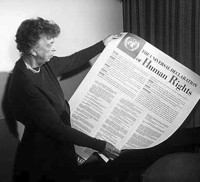Eleanor Roosevelt once said that universal human rights begin “in small places, close to home.” It might be more accurate to say that they begin in the home, as the most intimate expression of whether human rights are respected within a society occurs between husbands and wives.
Too often, however, the circumstances under which men and women come together to form households fall short of meeting basic standards of human rights. In Yemen, Sudan, Nigeria, Colombia and a number of other countries, it is legal for girls to be married younger than age 16. In many nations where child marriage is not legal, such as India, Afghanistan and Ethiopia, it is prevalent nonetheless. In such marriages, the groom is often at least a decade older than his child wife, whose consent is not actually required in many countries -- her father has the right to contract the marriage for her over her objections or even without her knowledge. A bride may not even meet her bridegroom until the wedding, making consummation of the marriage an act that can only be defined as rape.
Rape can even begin a marriage before the wedding has taken place. For example, in Kyrgyzstan, approximately one-third of marriages are “capture” marriages, where a girl is kidnapped and forced into marriage. Those who refuse to acquiesce are often raped, leaving them with no cultural alternative to accepting the marriage. Variations of “marriage through rape” are practiced in other societies throughout the world. Indeed, 15 Latin American countries have laws on the books that entitle a rapist to go free if he marries his victim or offers to marry her, even if she refuses.

